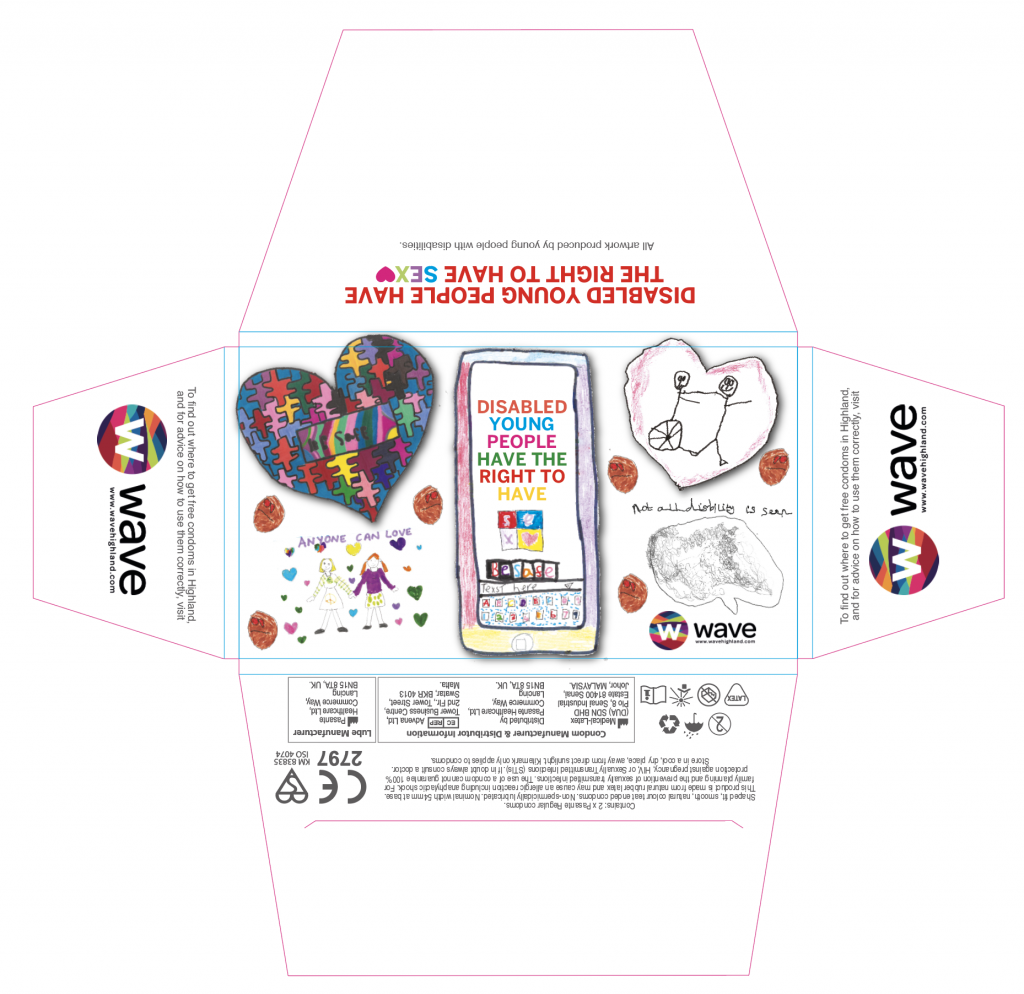Young People’s Condom Wallet Project

About the project:
In Autumn 2019, we went along to a Highland Children’s Forum meeting to talk about Wave and how we support young people with their sexual health and relationships. From hearing about our work, a couple of young people decided they wanted to get involved and run their own project.
Young people with additional support needs often don’t have the space to talk about their sexual health and relationships, so the group recruited some of their peers to get involved too. Determined to make young people’s voices heard, they got thinking about what they wanted to achieve and how they would do it.
What they told us:
Despite receiving some excellent RSHPE (relationships, sexual health and parenthood education) lessons in school themselves, the young people involved in the project felt strongly that RSHPE should be made much more accessible for disabled young people.
The group felt that able-bodied young people within mainstream education are often given much more information about these important topics, and at an earlier stage, than those with additional support needs.
This could potentially put them at risk. Like everyone else, disabled young people are less able to make safe choices within their relationships if they aren’t given enough information to do so.
Throughout the project, the group were able to reflect on their own experiences, and asked questions about RSHPE such as:
- Why do people assume that disabled young people can’t have good relationships or sex?
- Why don’t disabled young people get more support around sex and relationships? If they don’t learn about it, how can they stay safe?
- What could be done to make RSHP information and support more accessible to people with additional support needs?
- Why are disabilities not represented within mainstream sex education, when able-bodied people have relationships with disabled people?
- Why are invisible disabilities, such as autism and hearing impairments, not considered more in RSHPE? These disabilities can present barriers to reading social cues, such as body language, which are really important to consent and communication.
Making sexual health and relationships education inclusive:
Following some fantastic discussions, the group decided to create some artwork representing their chosen theme ‘Disabled young people have the right to have sex’. That artwork – all created by disabled young people – was then used to create condom wallets in partnership with condom manufacturer Pasante.
The group want their condom wallets to be a talking point, helping start positive conversations about how young people with disabilities can be better supported with sexual health and relationships. But the project doesn’t end there! The group have big plans to create accessible sexual health information for our Wave website, on topics such as how to use condoms safely.
The group is also planning a video conversation with a Pasante representative about how condom manufacturers can support disabled people within their product development.
At Wave, we believe that ALL young people under 25 should have access to the information and support that enables them to make safe, informed choices around sex and relationships. This includes young people with additional support needs. That’s why we’re delighted to have had the chance to support this group of Highland young people in turning their ideas on disability and sex into the fantastic project it has become.
This project is a partnership with Wave, Highland Children’s Forum, St. Clements school and Pasante, with thanks to funding from the National Lottery. A big thank you to all the young people involved in this project, for their time and contribution.
To find out more about relationships, sexual health and parenthood education provision for disabled young people in Scotland, visit RSHP.scot.

